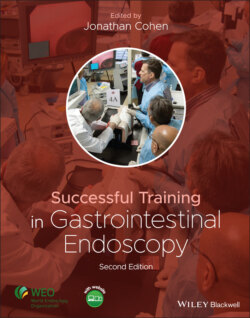Читать книгу Successful Training in Gastrointestinal Endoscopy - Группа авторов - Страница 40
Instrumentation
ОглавлениеA fundamental skill that should be in the skill set of any GI endoscopist is to be able to use instrumentation placed through the accessory channel to accomplish biopsy, snare a polyp, perform an injection, or apply energy for tissue destruction or hemostasis. Virtually, all GI endoscopes have a working channel through which instruments can be introduced. Although side‐viewing endoscopes are used in ERCP, or linear EUSs have an elevator that can be used to deflect the angle of accessories that exit the scope tip, most upper and lower endoscopes do not have a separate deflector for the instrument channel, hence control of the instrument must be achieved by orienting the working channel properly using the combination of tip deflection and torque of the scope to provide the best working angle between the instrument and the target. The endoscopist must be able to maintain a stable endoscopic position and clear view at all times when performing therapeutic procedures. At times, it may be helpful to have an assistant hold the endoscope in place while advancing the instrument, particularly if a stable position is hard to maintain.
Accurate targeting is a learned skill that can be practiced and evaluated. Metrics to evaluate targeting include time required to instrument the “lesion” once the target mucosa has been visualized, accuracy of placement of the instrument relative to the target, and number of attempts to direct the instrument to the target. This is relevant to a number of procedures such as biopsy in EGD, fine‐needle aspiration in EUS, cannulation in ERCP, and polypectomy in colonoscopy. Again, mastery of these tasks requires sufficient skill in scope handling and navigation, as well as an understanding of the cognitive aspects, such as indications for the intervention, potential complications, alternatives, and so on. This final stage of training is typically only reserved for advanced trainees who have successfully demonstrated proficiency in the fundamental earlier stages.
